French Bulldog
- February 2, 2024
- 0 comment
The French Bulldog, affectionately known as the “Frenchie,” is a captivating breed with a unique and endearing personality. These small and charming dogs are characterized by their distinctive bat-like ears, compact size, and brachycephalic (flat-faced) appearance. French Bulldogs are renowned for their friendly and affectionate nature, making them wonderful companions for families and individuals alike.

Despite their occasional stubbornness, they respond well to positive reinforcement training and form strong bonds with their owners. While their grooming needs are relatively low, special attention to their facial wrinkles is essential. French Bulldogs have a moderate exercise requirement, thriving in apartment living and various environments. With an average lifespan of 10 to 12 years, these delightful dogs bring joy and companionship to countless households around the world, making them a beloved breed among pet enthusiasts.
| Specification | Description |
|---|---|
| Size | Small |
| Height | 11 to 12 inches (28 to 31 cm) at the shoulder |
| Weight Range | 16 to 28 pounds (7 to 13 kg) |
| Coat | Short and smooth |
| Coat Colors | Fawn, Brindle, Pied, Cream, Blue, Chocolate, Lilac, Black and Tan, Merle, and more |
| Lifespan | 10 to 12 years |
| Temperament | Friendly, affectionate, loyal, and playful |
| Exercise Needs | Moderate, daily walks and playtime |
| Trainability | Intelligent but may be stubborn; responds well to positive reinforcement |
| Grooming Requirements | Regular brushing, facial wrinkle care, occasional baths, and dental care |
| Health Concerns | Brachycephalic-related respiratory issues, joint problems, and skin conditions |
| Sensitivity to Weather | Sensitive to extreme heat and cold; requires temperature considerations |
| Ideal Living Spaces | Adaptable to apartment living and various environments |
| Common Behaviors | Playfulness, snoring, and vocalizations |
French Bulldog: A Beloved Canine Companion
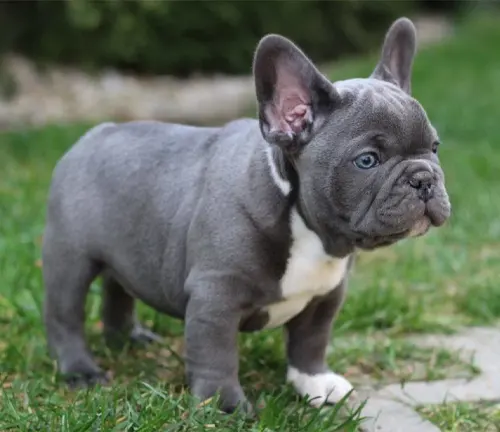
The French Bulldog, often referred to as the “Frenchie,” is a charming and popular breed known for its distinctive appearance and affectionate personality. In this article, we will delve into the world of French Bulldogs, exploring their history, characteristics, care requirements, and much more. Whether you’re a prospective dog owner or just curious about this delightful breed, read on to discover everything you need to know about French Bulldogs.
A Brief History
French Bulldogs have a rich history that dates back to the 1800s. They originated in France and were initially bred as miniature Bulldogs, primarily as companions for lace workers in Nottingham, England. Over the years, the breed’s popularity grew, and they made their way to France, where they acquired their name, the French Bulldog. These dogs soon became a symbol of affluence and elegance, gracing the laps of the French elite.
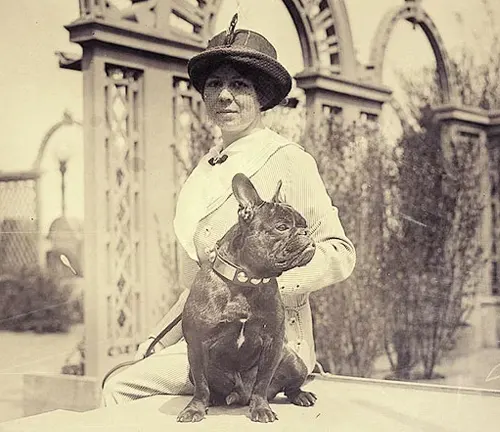
Unique Appearance
Compact Size
French Bulldogs are small and compact, making them an excellent choice for individuals and families living in apartments or homes with limited space. Their diminutive stature is part of their charm.
Bat-like Ears
One of the most striking characteristics of French Bulldogs is their bat-like ears. These ears stand erect and are often described as “bat ears.” They contribute to the breed’s expressive and endearing appearance, adding a touch of whimsy to their overall look.
Brachycephalic Face
French Bulldogs have a brachycephalic facial structure, which means they have flat faces and short noses. While this feature gives them their adorable, unique look, it also comes with certain health considerations, as brachycephalic breeds can be prone to breathing difficulties and overheating. French Bulldog owners need to be aware of these potential issues and take appropriate precautions to ensure their pet’s well-being.
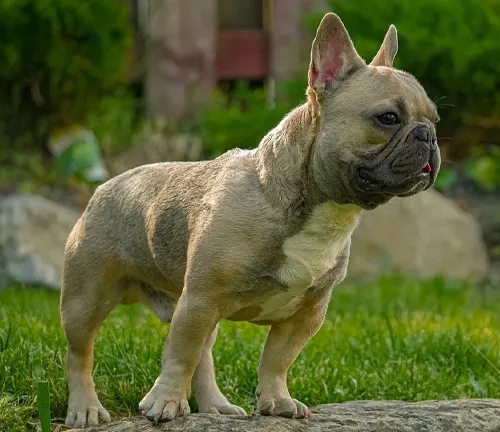
Temperament and Personality
Friendly and Affectionate
French Bulldogs are exceptionally friendly and affectionate dogs. They thrive on human companionship and often form strong bonds with their owners. Their affectionate nature makes them excellent companions for individuals and families alike.

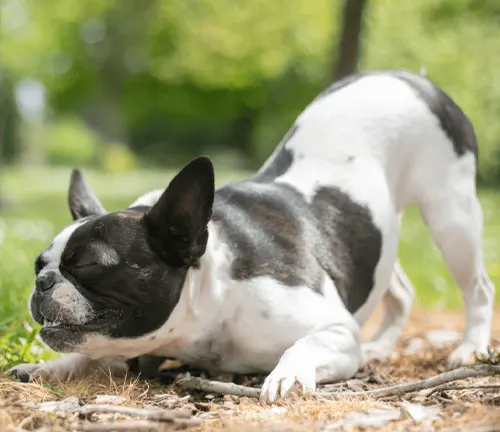
Playful Yet Gentle
Despite their small size, French Bulldogs have a playful side. They enjoy engaging in playful activities and games with their owners. What sets them apart is their remarkable gentleness, making them well-suited for families with children. They are patient and tolerant, making them great playmates for kids.
Loyal and Protective
French Bulldogs are known for their loyalty to their owners. They have a protective instinct and will often alert their owners to potential dangers or strangers approaching the home, making them excellent watchdogs despite their small size.
Adaptable
French Bulldogs are adaptable and can thrive in various living environments, whether in a bustling city apartment or a suburban home. Their small size makes them versatile and well-suited to different lifestyles.
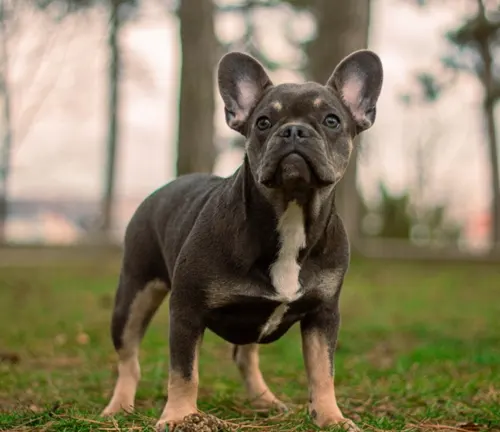
Affinity for Comfort
French Bulldogs are known for their love of comfort. They enjoy lounging on soft surfaces and seek out cozy spots for relaxation. Their tendency to snuggle up with their owners adds to their endearing nature.
Low Exercise Needs
While they appreciate playtime, French Bulldogs do not require extensive exercise. Short walks and occasional play sessions are typically sufficient to keep them healthy and happy. This makes them a practical choice for individuals with busier lifestyles.
Low Barking Tendency
Unlike some other small breeds, French Bulldogs are not prone to excessive barking. They tend to bark only when necessary, which is another quality that makes them great companions for urban living.
Health and Care


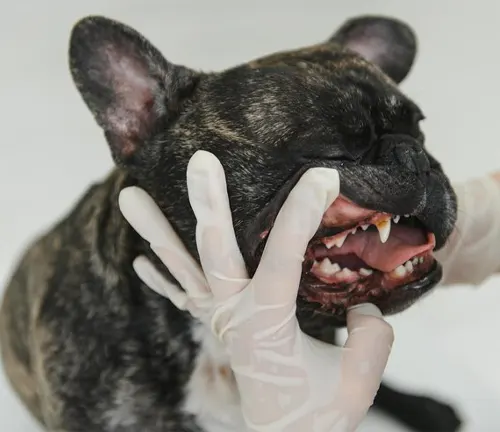
- Brachycephalic Health Concerns: French Bulldogs have a brachycephalic (flat-faced) structure, which can lead to several health issues. These include brachycephalic obstructive airway syndrome (BOAS), which can cause breathing difficulties. Owners should be vigilant about signs of respiratory distress, especially in hot or humid weather.
- Regular Exercise: Despite their small size, French Bulldogs benefit from daily exercise. Short walks and playtime in a secure area are typically enough to keep them fit and maintain a healthy weight. However, they are sensitive to extreme heat, so exercise should be moderated in hot weather.
- Nutritional Needs: Providing high-quality dog food is crucial for French Bulldogs. Their diet should be well-balanced and appropriate for their age, size, and activity level. Portion control is essential to prevent obesity, a common issue in this breed.
- Dental Care: French Bulldogs are prone to dental problems due to their crowded teeth. Regular dental care, including brushing their teeth or providing dental chews, is important to maintain good oral hygiene.
- Regular Vet Check-ups: Routine veterinary check-ups are vital for French Bulldogs. These visits can help catch and address any health issues early. Vaccinations, deworming, and flea and tick prevention should also be part of their healthcare regimen.
- Temperature Sensitivity: French Bulldogs are sensitive to extreme temperatures, particularly heat. They can easily overheat due to their brachycephalic faces. Owners should provide a cool, shaded area during hot weather and avoid strenuous exercise when it’s hot.
- Skin Care: Their loose, wrinkled skin requires attention. Cleaning their facial wrinkles, particularly around the nose and eyes, is essential to prevent skin irritation and infection.
- Regular Grooming: French Bulldogs have short coats that are easy to maintain. Regular brushing helps remove loose hair and dirt, keeping their coat in good condition. Bathing should be done as needed to prevent skin issues.
- Spaying and Neutering: Many veterinarians recommend spaying or neutering French Bulldogs to prevent unwanted pregnancies and reduce certain health risks. Discuss the timing of this procedure with your vet.
- Parasite Control: Preventing parasites, such as fleas, ticks, and intestinal worms, is crucial. Regularly administer parasite control medications as advised by your veterinarian.
Training and Socialization
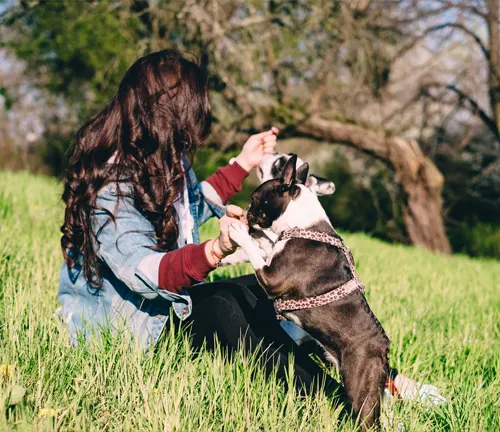
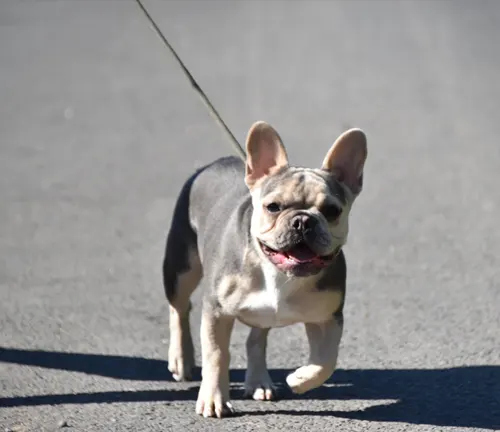
- Positive Reinforcement: French Bulldogs respond well to positive reinforcement training techniques. Use treats, praise, and rewards to reinforce desired behaviors. This approach helps them learn commands and tricks effectively while strengthening the bond between you and your Frenchie.
- Early Socialization: Early socialization is crucial to ensure that French Bulldogs grow up to be well-adjusted and confident dogs. Expose them to various people, animals, and environments during their puppyhood. Puppy classes and playdates with other dogs can be beneficial.
- Consistent Routine: French Bulldogs thrive on routine. Establish a consistent daily schedule for feeding, bathroom breaks, exercise, and bedtime. This predictability helps them feel secure and reduces anxiety.
- Leash Training: Leash training is essential to ensure your French Bulldog walks comfortably on a leash. Start with short walks and gradually increase the distance. Use positive reinforcement to reward loose leash walking and discourage pulling.
- Behavioral Challenges: Be aware that French Bulldogs can be a bit stubborn at times. When dealing with behavioral challenges, such as housebreaking or excessive barking, patience and consistency are key. Seek professional training assistance if needed to address specific issues.
Grooming Requirements
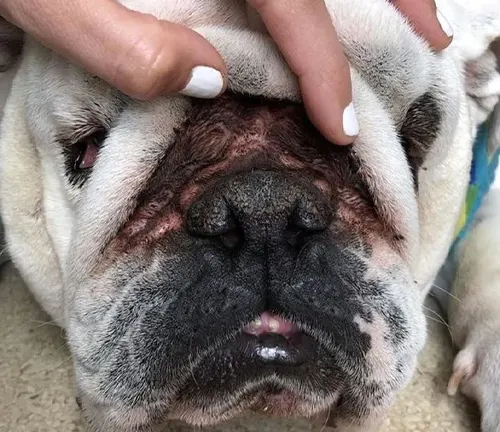
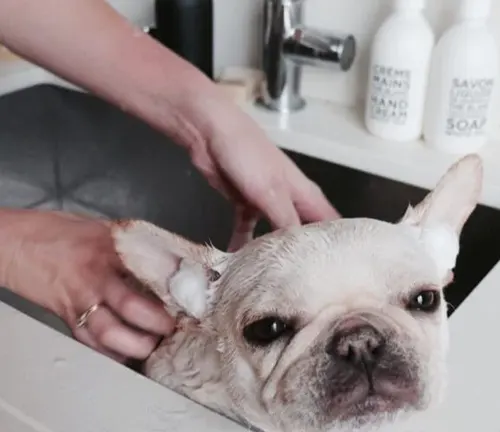
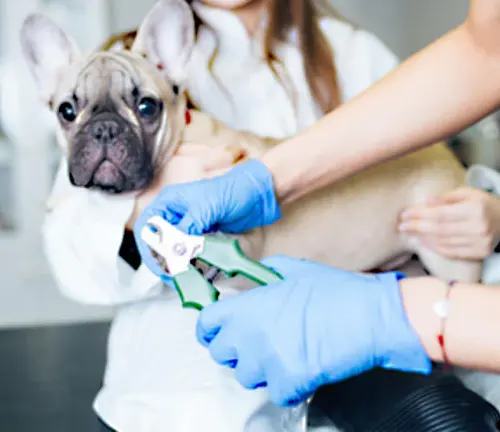
- Facial Wrinkle Care: Taking care of their facial wrinkles is of utmost importance. These wrinkles can trap moisture and dirt, leading to skin irritation and infections. Daily cleaning and drying of their facial wrinkles help prevent skin problems and discomfort.
- Regular Brushing: While French Bulldogs have short coats that require less grooming than some other breeds, regular brushing is still essential. It helps remove loose hair, distribute natural oils, and keep their coat healthy. Brushing at least once a week is crucial to maintain their coat’s condition.
- Nail Trimming: Keeping their nails trimmed is essential for their comfort and mobility. Overgrown nails can lead to pain and difficulties in walking. Regular nail trimming, every few weeks or as needed, ensures that their nails are at an appropriate length.
Different Species
Fawn
Fawn French Bulldogs have a solid tan or light brown coat with a black mask on their face. They may have a small amount of white markings on their chest and paws.

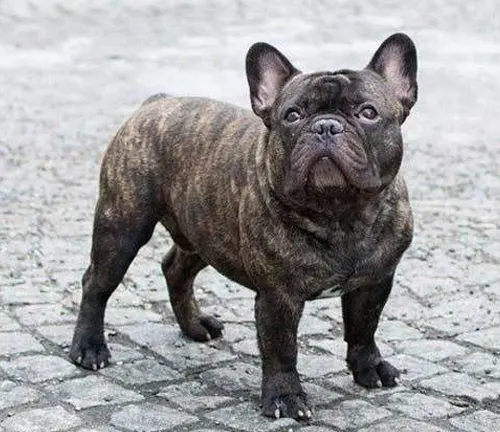
Brindle
Brindle French Bulldogs have a mix of dark and light stripes on their coat, giving them a tiger-stripe appearance. The stripes are typically darker than the base color.
Pied
Pied French Bulldogs have a mostly white coat with patches of any other color. They often have a white face with a colored mask around one or both eyes.


Cream
Cream French Bulldogs have a pale, creamy coat color without the darker mask seen in fawn French Bulldogs.
Blue
Blue French Bulldogs have a solid blue-gray coat color. The blue coloration is the result of a dilution gene that affects the black pigment in their coat.
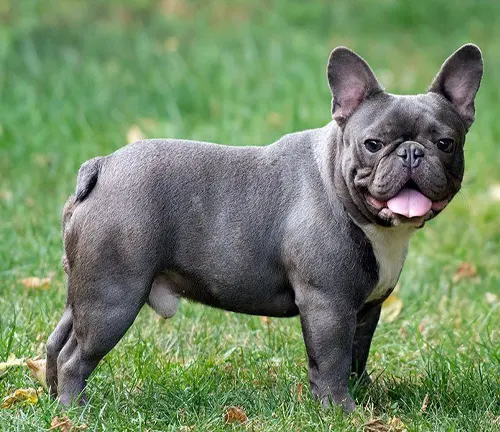

Chocolate
Chocolate French Bulldogs have a solid brown coat color, which is the result of a different dilution gene affecting their black pigment.
Black and Tan
Some French Bulldogs may have a black coat with tan markings on their face, legs, and under their tail, similar to the markings of a Doberman Pinscher.

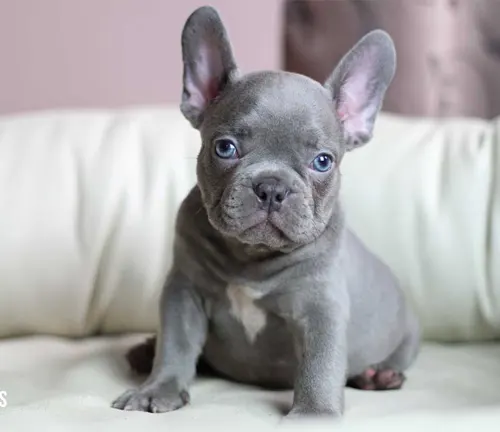
Lilac
Lilac French Bulldogs have a pale, lavender-colored coat due to a combination of the dilution gene and the chocolate gene.
Merle
Merle French Bulldogs have a marbled or mottled coat pattern with irregular spots and patches of color. Merle is not a standard color in the breed and is considered rare.

Frequently Asked Question (FAQs)
- What is the average lifespan of a French Bulldog?
The average lifespan of a French Bulldog is around 10 to 12 years, although some can live longer with proper care. - Are French Bulldogs good with children and other pets?
Yes, French Bulldogs are generally good with children and other pets. They have a friendly and gentle temperament, making them suitable for family environments. - Do French Bulldogs shed a lot?
French Bulldogs have a short coat and do shed, but their shedding is considered moderate compared to breeds with longer hair. Regular brushing can help manage shedding. - What is the typical size and weight range for adult French Bulldogs?
Adult French Bulldogs typically weigh between 16 to 28 pounds (7 to 13 kg) and stand around 11 to 12 inches (28 to 31 cm) in height at the shoulder. - Are French Bulldogs prone to specific health issues?
Yes, French Bulldogs are prone to certain health issues, particularly related to their brachycephalic (flat-faced) structure. These issues can include respiratory problems, joint concerns, and skin conditions. - How much exercise do French Bulldogs need daily?
French Bulldogs have relatively low exercise needs. They benefit from short daily walks and occasional playtime but should avoid strenuous exercise due to their sensitivity to heat. - Do French Bulldogs require special grooming due to their wrinkles?
Yes, French Bulldogs require special attention to their facial wrinkles. Daily cleaning with a damp cloth and drying is essential to prevent skin irritation and infections. - Are French Bulldogs easy to train?
French Bulldogs are intelligent but can be a bit stubborn. Positive reinforcement training methods work best, and patience is key. - What is the ideal diet for a French Bulldog, and how often should they be fed?
The ideal diet for a French Bulldog includes high-quality dog food appropriate for their age and activity level. Feeding should be divided into two meals per day to prevent overeating. - Do French Bulldogs snore or have breathing problems due to their brachycephalic faces?
Yes, French Bulldogs are prone to snoring and may have breathing problems, especially in hot or humid weather. Owners should be aware of these issues and provide a comfortable living environment. - Are there any specific temperature considerations for French Bulldogs du to their sensitivity to heat and cold?
French Bulldogs are sensitive to extreme temperatures, especially heat. They should be kept cool in hot weather and provided with warm shelter in cold weather. - What are the common behavioral traits of French Bulldogs?
Common behavioral traits of French Bulldogs include affection, playfulness, loyalty, and adaptability to different living environments. - How can I find a reputable breeder if I want to get a French Bulldog puppy?
To find a reputable breeder, research local breed clubs, ask for references, and visit the breeder’s facility to ensure proper care and breeding practices. - Do French Bulldogs make good apartment pets?
Yes, French Bulldogs make excellent apartment pets due to their small size and lower exercise needs. - Are French Bulldogs known for any unique quirks or characteristics?
Yes, French Bulldogs are known for their charming personalities, including their tendency to “talk” in unique vocalizations and their love for cozy spots. - What is the cost of owning a French Bulldog, including initial expenses and ongoing care?
The cost of owning a French Bulldog includes initial expenses like adoption or purchase fees, vaccinations, spaying/neutering, and ongoing expenses such as food, grooming, and vet care. - How often should I take my French Bulldog to the veterinarian for check-ups and vaccinations?
French Bulldogs should have regular check-ups at least once a year, and vaccinations should be administered as recommended by your veterinarian. - What is the best way to introduce a new French Bulldog to my home and family?
Introduce your new French Bulldog gradually, providing a quiet and safe space. Allow time for bonding and gradually introduce them to other family members and pets. - Are there any specific toys or activities that French Bulldogs enjoy the most?
French Bulldogs often enjoy interactive toys and games that stimulate their minds. Puzzle toys and short play sessions can keep them engaged. - What should I consider if I want to adopt a French Bulldog from a rescue or shelter?
When adopting, consider the dog’s history, health, and temperament. Be prepared for potential behavioral challenges and consult with a shelter or rescue staff for guidance.










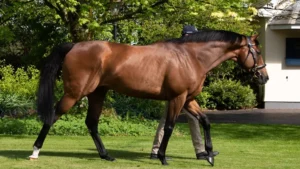

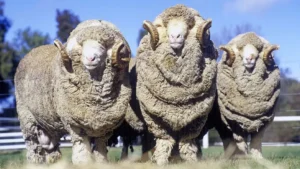

Leave your comment